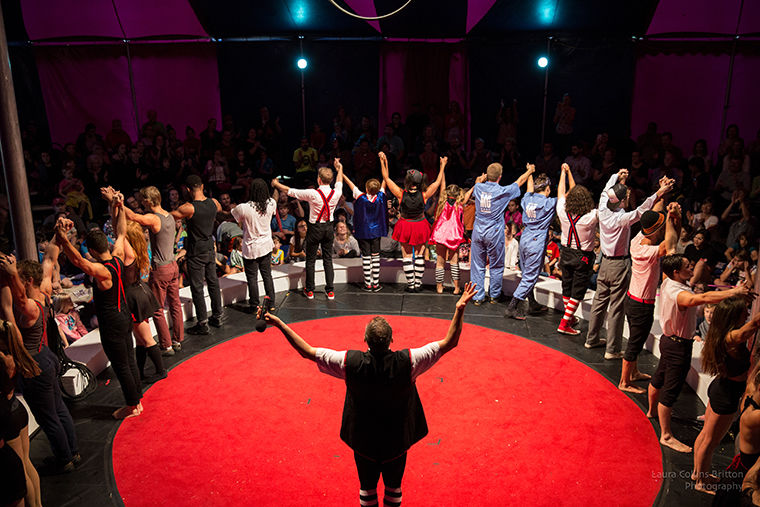Under the big top of Chicago’s Midnight Circus
Midnight Circus will be traveling to various Chicago parks during their 2018 tour.
October 2, 2018
What started as a performance in a Chicago storefront theater that held only 50 people, blossomed into a traveling circus that has raised nearly $1 million for Chicago parks.
Midnight Circus of Chicago is a traveling big top that produces an annual performance at various parks throughout the city. Founded by Jeff and Julie Jenkins, Midnight Circus arose from the couple’s desire to pursue a fun way to become more involved in the Chicago community, as well as their love for the entertainment realm, Jenkins said.
“[Midnight Circus] came out of a collaboration between my wife’s background and my background,” Jenkins said. “She was a theater major, actress and dancer. I was a clown at Ringling Brothers and Barnum & Bailey Circus.”
The goal of Midnight Circus is not only to bring live entertainment to various parks around the city, but to inspire Chicagoans to get out into their communities, Jenkins said.
“We always like the opportunity for folks in Chicago to meet their neighbors,” Jenkins said. “Because [the circus tent is] a circle, you’re staring across the ring at your neighbors. We love that people get to know each other throughout the course of the show.”
A portion of profits from each performance goes directly to the Chicago Park District’s advisory councils, Jenkins said. The money was typically used to restore playgrounds, but following 12 years of the show, many playgrounds are up to date. Today, the money is used where it is needed.
“One park used the funding to help supplement their after-school tutoring program because a lot of the kids who would frequent that park needed help,” Jenkins said. “[Another] one of the playgrounds we helped fund was a fully accessible playground at Independence Park.”
Chicago native and sophomore computer animation major Sabrina Velazquez said she admires the work Midnight Circus does.
“[Chicago’s] Parks are something to take care of,” Velazquez said. “I have lived here all my life, and more money and more care going into the parks and recreation system is really important to me.”
Unlike traditional circuses, Midnight Circus only includes rescued bully breed dogs in their shows, Jenkins said. The inclusion is often a highlight for attendees, especially children, he said.
“It’s a really interesting approach,” said sophomore computer animation major Emma Schober. “Usually, when you think of circus, you think of lions and stuff like that, [but] to have a pit bull there is sweet. I certainly appreciate their focus on using these stigmatized animals in an already stigmatized industry.”
Each year brings a new narrative to the circus, Jenkins said.
“[The shows] are intimate, exciting [and] they really hit on all the emotions. There are world-class acrobatics, beautiful storytelling, live music elements [and] it is visually stunning,” Jenkins said.
According to Jenkins, ticket pricing is based on whether the park is deemed tier one or tier two. Tickets for shows in tier one parks cost $22 per person, and tickets for tier two shows cost $5.
“We wanted to make sure that every community we played [in] people could afford to see the circus. It doesn’t matter how good the show is or how much money potentially could be raised if people can’t afford to see it,” Jenkins said. “We always say [Midnight Circus] is as accessible as it is exciting.”








